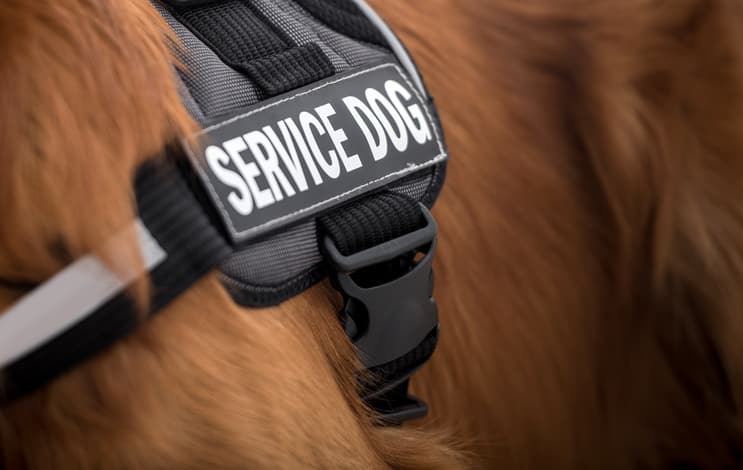
Photographer and writer Roger Caras once said, “Dogs are not our whole life, but they make our lives whole.” Anyone who has been privileged enough to have a dog as a pet can probably appreciate this sentiment. But this quote is particularly powerful when thinking of service dogs who assist survivors of traumatic brain injuries (TBI).
Following a serious injury, a person’s life can change in significant ways. TBIs can impact a person’s functional physical abilities, cognitive abilities, and mental health and emotional well-being. A support network consisting of family, friends and medical professionals can help a TBI survivor with recovery, rehabilitation and adapting to a new normal.
In this blog post, we look at the contribution service dogs make to this support network, including new research that indicates interaction with service animals can actually promote healing within the body and brain.
Traumatic Brain Injuries (TBI)
TBIs vary in intensity and can have a dramatically different impact on a survivor’s day-to-day life. A TBI survivor may have difficulty with movement and co-ordination, experience a loss of feeling or sensation, suffer from loss of consciousness/fainting spells, suffer from tremors, acquire visual or hearing impairments, among many other physical symptoms.
Although dealing with changes in physical functional abilities can also put a strain on one’s mental health and cause emotional difficulties (depression, anxiety, change in personality), a person with a TBI may have limited or no physical symptoms, but still experience significant changes in brain chemistry and neurological function. TBI survivors may experience difficulties with memory, confusion, and anxiety in social situations as an effect of their injury.
A Best Friend and Trusted Helper
Specially trained service dogs for people with TBIs have had great success in helping survivors adjust to the challenging new conditions in their lives. For instance, service dogs can be trained to assist a TBI patient in managing a variety of symptoms of their injury:
- Mobility/Loss of Consciousness – Service dogs have been trained to assist patients balance while walking, to retrieve dropped items and to prevent additional injuries due to poor co-ordination or visual impairment. These animals can also help a person to practise specific rehabilitation exercises, including grasping, self-dressing and targeting. If a person’s injury results in occasional episodes of fainting or loss of consciousness, service dogs can be trained to lick, nudge, or otherwise reawaken the TBI patient, or alert others that help is needed. As a person’s trusted guide and assistant, service dogs can give TBI patients the confidence to be active and social outside of their homes.
- Memory Problems/Confusion/Anxiety – If a TBI patient’s injury causes them to have difficulty remembering to eat or take medication at regular intervals, a service dog can be trained to remind them, or retrieve certain needed materials. Moreover, service dogs can learn complex routines to assist a TBI patient who may become confused or disoriented, and develop safety protocols to lead them back to a safe place. If a TBI patient becomes stressed during certain activities, service dogs can also learn techniques to calm them.
- Loneliness/Companionship – During recovery and rehabilitation, a TBI patient may feel physically and emotionally removed from their previous life and support networks. A service dog provides a sense of constant support, companionship and can help elevate a person’s mood.
The Healing Power of a Good Dog
In addition to the practical and functional help a service dog can offer a TBI patient, recent research suggests the presence of a service animal in a survivor’s life can actually influence neurohormone production.
Research into veterans with a mild TBI found a statistically significant increase in pituitary dysfunction and reduced neural and hormone function in the parts of the brain (prefrontal cortex/amygdala) that regulate emotional control, empathy, memory and learning. One neurohormone – oxytocin – that is impaired by TBIs is associated with symptom severity.
Increasing oxytocin in a TBI patient reduces stress response and negative stimuli response, reduces heart stress and heart rate variability, reduces perception of pain, anxiety and depression, promotes sleep, and promotes positive effects on social behaviour like trust, bonding, and empathy.
Remarkably, positive and friendly contact with dogs, including service dogs, has been found to increase oxytocin in humans generally, and a program that provides service dogs to veterans with TBIs and post-traumatic stress disorder has resulted in many encouraging clinical observations.
Conclusion
Long considered (hu)man’s best friend, dogs – and especially service dogs – have developed a purpose beyond friendship for people with serious injuries and disabilities. If you or a loved one has suffered from a traumatic brain injury, you may have access to benefits or awards or damages from a personal injury which could cover some or all of the costs involved with obtaining a service animal to assist in your recovery.
If you believe you may have a legal case or claim to these benefits and compensation, please contact Sandra Train at 416-361-7573; strain@hshlawyers.com or Michael Henry at 416-361-0889; mjhenry@hshlawyers.com.







